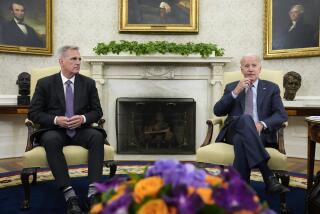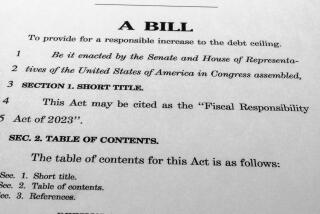Obama and Boehner seem to get along fine; politics is the problem
- Share via
WASHINGTON — In summer 2011, negotiations between President Obama and House Speaker John A. Boehner over raising the debt ceiling featured plenty of drama.
There were private grumbles, a very public round of golf, a phone call from the White House that went unreturned and, overall, a lost opportunity to secure a “grand bargain” on spending and taxes.
Now, as high-stakes talks between Obama and Boehner rev up again, the lessons of that summer appear to be producing a new steadiness and comfort level between the two men.
After weeks of private phone calls and public posturing, the Ohio Republican quietly ducked into the White House on Sunday for his first one-on-one meeting with the president since mid-2011. The goal this time: forging a deal to avoid $500 billion in tax increases and spending cuts set to take effect in early January.
The face-to-face session came and went without a flood of leaks or post-meeting spin by either camp. The two sides even issued identical brief statements saying “lines of communication remain open,” a far cry from Boehner’s public complaint last Friday that prospects for compromise were “nowhere.”
Obama had greased Sunday’s meeting by giving Boehner a bottle of fine Italian wine — a Brunello di Montalcino — for his birthday on Nov. 17. Red wine was the speaker’s drink of choice during the tense talks last year to raise the federal debt ceiling.
Boehner, for his part, didn’t just call the president to wish him happy birthday. The son of a barkeeper sang him the first verse of the “Boehner Birthday Song,” a three-sentence chant that ends with a Polka-style “Hey!”
“Personality has never been a roadblock to an agreement,” said Brendan Buck, a Boehner spokesman. “The two men get along very well.”
White House spokesman Jay Carney returned the sentiment: “The president likes and respects Speaker Boehner and looks forward to continuing to work with him.”
If a deal falls apart, it probably will be a matter of politics, not personalities.
Members of the Republican right flank are all but certain to revolt if Boehner agrees to the president’s proposal to raise taxes on the wealthiest Americans. And Obama will take heavy flack from left-leaning Democrats if he agrees to spending cuts sought by the GOP in Medicare, Social Security and other popular entitlement programs.
For weeks, the president has tried to build public pressure on Republicans. He kept the campaign up on Monday at a diesel engine plant near Detroit, where he suggested he was the one seeking a middle ground.
“I’ve said I will work with Republicans on a plan for economic growth, job creation and reducing our deficits and that has some compromises between Democrats and Republicans,” Obama said. “I understand people have a lot of different views.”
But Obama has not tried to go around or embarrass Boehner by seeking support from other Republican lawmakers. Boehner, in turn, has made a concerted effort to tone down the conservative critics in his ranks.
Obama had little one-on-one contact with Boehner, then the House Republican leader, in the first two years of his presidency. As the debt ceiling battle escalated in June 2011, the two men staged their first notable meeting on neutral territory: the golf course at Andrews Air Force Base. Obama and Boehner played on the same team, beating Vice President Joe Biden and Ohio Gov. John Kasich.
“They really made an effort with the theatrics with the golf game, for example, to show a message of reassurance that these people were not blood enemies,” said Ross Baker, a professor of American politics at Rutgers University.
The game was followed by secret meetings, and they began to hammer out a $4-trillion “grand bargain” deficit-cutting deal. The talks were torpedoed and resuscitated throughout July. They came to an acrimonious end on July 22, with Boehner accusing Obama of moving the goal posts on new tax revenue.
Obama, appearing on television, groused about being “left at the altar” for the second time that month. Aides said Boehner had not returned the president’s phone call.
Instead of a historic bargain, Congress passed a smaller deficit reduction bill at the 11th hour, including automatic across-the-board spending cuts now at play in the “fiscal cliff” talks.
Neither man seems to be holding a grudge — for now.
kathleen.hennessey@latimes.com
Lisa Mascaro and Michael A. Memoli in the Washington bureau contributed to this report.
More to Read
Get the L.A. Times Politics newsletter
Deeply reported insights into legislation, politics and policy from Sacramento, Washington and beyond. In your inbox twice per week.
You may occasionally receive promotional content from the Los Angeles Times.











